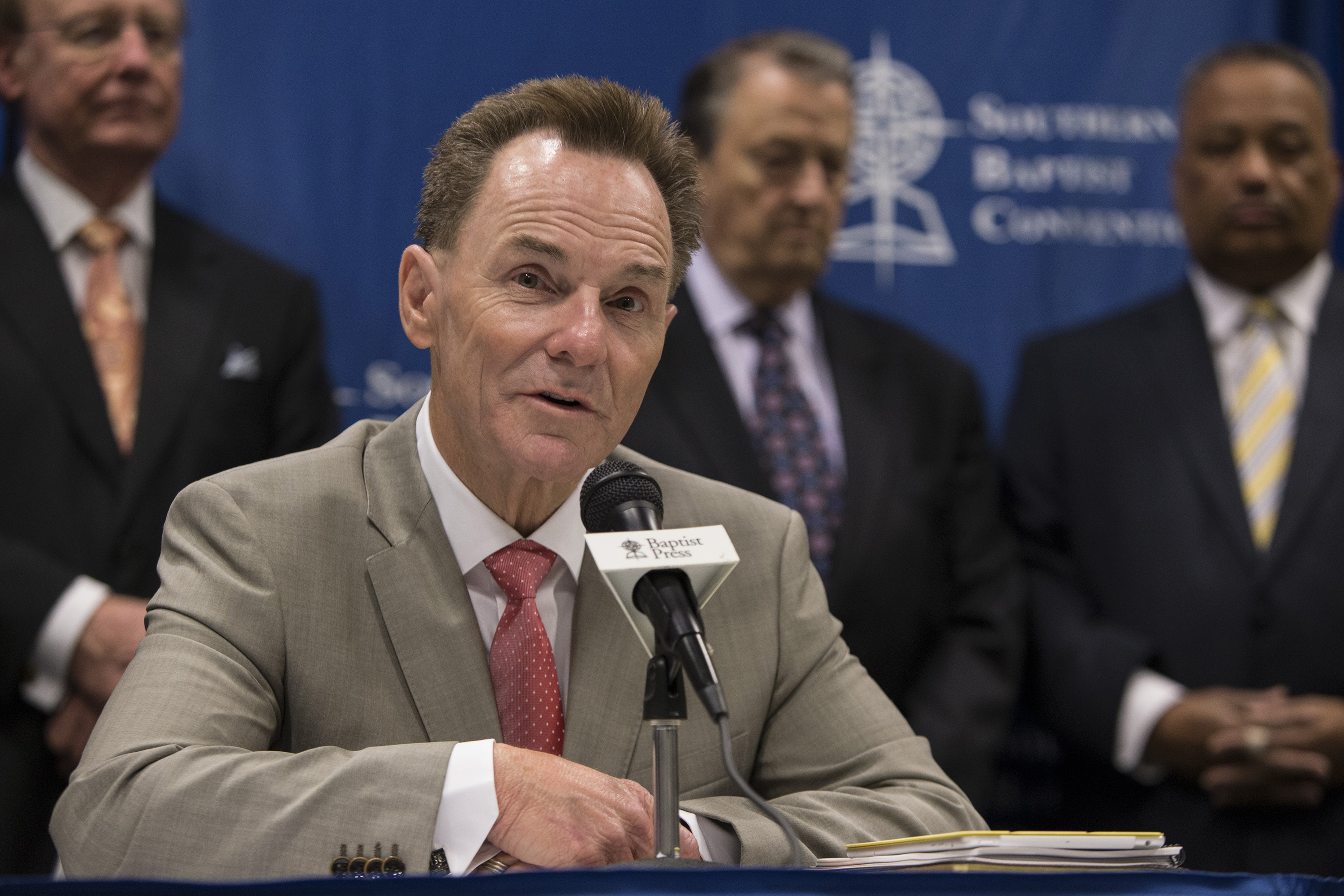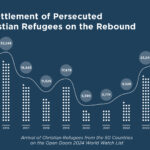
JACKSON, Tenn. (BP)–Last October, nearly 2,000 friends, trustees, faculty, staff and students of Union University had the unique opportunity to welcome former Soviet Union President Mikhail Gorbachev to Jackson, Tenn. Mr. Gorbachev spoke for almost one hour on the topic “From Totalitarianism to Democracy.” The former president was warm, personable and engaging for everyone who met him.
Mr. Gorbachev, certainly one of the world’s shaping leaders (along with Reagan, Bush, Kohl, Thatcher and Pope John Paul) at the end of the 20th century, raised our understanding of the big, diverse world in which we live. Simultaneously we felt that the world is closer together than ever before, sharing new common ground. For these two reasons alone, not to mention others, the world of the 21st century will be different than the one known by previous generations in earlier eras who lived through the Cold War (for those of us who grew up in this time we will never forget Khrushchev, the Cuban missile crisis, the race to space and the Berlin Wall tensions).
One of our goals at Union University is for faculty, staff and students to begin to understand the implications of the global context in which we now live. Thus we have invited leaders like Margaret Thatcher, Mikhail Gorbachev and Colin Powell to headline the last three scholarship banquets. It is why we are excited that students from more than 25 countries are currently enrolled at Union University. It is why we have international and intercultural studies programs in a variety of disciplines, as well as numerous missions opportunities for students, staff and faculty. We want every Union student to have some type of cross-cultural experience during his or her time here as an aspect of preparing for life and service in the world.
Union University seeks to be a faithful Christ-centered university. Union is committed to rigorous academics grounded in a Christian worldview. We want to see students learn to think and live Christianly so they can be salt and light in the world. Every Union faculty member professes Jesus Christ as Lord of his or her life and seeks to show how the Christian faith can be integrated with teaching and learning.
How, then, does this ideal square with invitations to Lady Thatcher, General Powell and President Gorbachev? The first two are clearly theistic in their view of the world, though neither is an outspoken evangelical Christian. In their talks at Union both made references to the importance of faith in their lives and in culture.
I have had opportunities to talk to all three about Christianity, the role of religion in the public square and personal faith commitments. I must say that Mr. Gorbachev was the most engaging and reflective of the three. He seems to acknowledge the existence of a Supreme Being, though it is hard for him to distinguish this Being from the cosmos.
It is probably not unfair to describe Mr. Gorbachev as some type of pantheist or panentheist. He is very interested in Jesus Christ and I personally think his reference to Jesus Christ as a socialist (I believe it is incorrect to think of Jesus as a socialist or a capitalist) was a well-intentioned attempt to connect with us, for I had told him that most people in the audience would identify themselves as followers of Christ. (He is certainly not the first person to suggest that Jesus was a socialist; any one of a dozen prominent liberation theologians have made a similar claim). I think it wrong to think of Jesus as a socialist, for socialism focuses on the impact of systems on people which causes them to act in a certain way. Thus systemic issues tend to overshadow individual ones. Yet Jesus said it is what is inside men and women (sin) that causes them to act in a particular way, placing the responsibility on the individual. Christians must acknowledge that we often miss Jesus’ genuine concern for the poor and outcasts of society. As a matter of fact, Jesus’ inauguration of the kingdom of God was accompanied by an announcement to free captives, to heal the hurting and to help the poor (Luke 4). Mr. Gorbachev’s statement that Americans have 40 percent of the world’s resources while only making up 5 percent of the population is a reminder of the responsibility that is ours — for to whom much is given, much will be required.
Perhaps more significant than anything he said all night was his shocking statement that the shortcoming of communism was that it sought to bring heaven on earth. Didn’t Jesus say “my kingdom is not of this world”? The great early church theologian, Augustine, indicated that all earthly kingdoms are robbers. These words are reminders for Christians to focus on eternal verities.
Still we must ask, “Can we at a Christian liberal arts institution be faithful to our mission by listening to and learning from leaders like Mr. Gorbachev?” I believe we can. We do not have to agree with him to listen and learn from him. A Christian liberal arts education is not an education where we only study the Bible and Christian thinkers — though that is primary and shapes our worldview and commitment to Christian truth through which we hear from and learn from others. A Christian liberal arts education is not necessarily equated with indoctrination, for it is just as important to learn how to think as it is to learn what to think.
The apostle Paul cited non-Christian Stoic philosophers on Mars Hill (Acts 17) and later quoted Cretan poets to his apostolic legate Titus. From Justin Martyr to Augustine to Thomas Aquinas to Luther and Calvin we see evidence of such broad learning — what they referred to as “robbing from the Egyptians.”
Our approach to Christian liberal arts education implies that the knowledge of all that is most excellent in human life is communicated to us through common grace. Christian thinkers through the centuries have maintained that we can be helped in all areas of thinking by the enablement and assistance of non-Christians.
Our responsibility is to listen carefully and then to think Christianly about what has been said. We must challenge what we believe to be inconsistent with a Christian worldview, such as Mr. Gorbachev’s statement that Jesus is a socialist; that God is indistinguishable from his creation; that religion’s primary purpose is to promote morality, his New World Order, and his syncretistic approach to religious pluralism. We can do so with grace and respect toward Mr. Gorbachev while maintaining and confessing our convictions that Jesus alone is the Way, the Truth, and the Life (John 14:6).
At Union University we will only invite Christians for the purpose of leading worship, for classroom instruction that integrates faith and learning, and for special speakers to help us shape and form a Christian worldview. We desire to be faithful to our Christ-centered core values. But having special speakers like Mr. Gorbachev at a community event like the Scholarship Banquet or a Jew like Michael Medved at a Union Forum, or other special academic lectureships can help us take a step out of our evangelical ghetto mentality.
It helps us, in the words of Chuck Colson, learn to practice a backyard apologetic while overcoming our inferiority complex about engaging the world. We can learn to see the big and diverse world we live in while holding faithfully to our commitment that God, who revealed himself ultimately in Jesus Christ, is the source of all truth. While we want Union University to be unapologetically Christian, we recognize that an institution of higher education has a broader mission and purpose than a church.
It is important to remember that we do not have to agree with Mr. Gorbachev to learn from him. We can admire the fact that he is one of the handful of leaders who literally changed the course of the 20th century. Through his policies he opened the door for economic changes and freedom for his people — freedom of speech, freedom of religion, freedom of life. In many ways his topic “From Totalitarianism to Democracy” was a personal autobiographical account of his life as well as the story of the demise of communism in the Soviet Union.
I do not think it is out of line to see Mr. Gorbachev as a modern-day Cyrus or Artarxerxes who opened doors for God’s people. Though Mr. Gorbachev may not himself be a God-fearer, within the providence of God, he was used to end the reign of communism in Eastern Europe and the Soviet Union, which in turn has opened the door for the gospel message. This is not unlike how Cyrus opened the door for God’s people to return home following the Babylonian captivity or how Artarxerxes was used to provide resources for Nehemiah to rebuild the wall of Jerusalem. Mr. Gorbachev inherited an oppressive system that had developed for more than 70 years. He courageously decentralized the government, signed two broad disarmament pacts, ended communist rule, called for the fall of the Berlin Wall and opened the door for freedom — even when many of his closest supporters discouraged him from doing so.
A dozen years ago there were few personal and economic freedoms, and no evangelical missionaries allowed in Russia. Today there are as many missionaries there as any country in the world. For the advancement of gospel throughout this part of the world in recent years Christians can only give thanks. Perhaps in God’s good providence Mr. Gorbachev himself will one day be open to the gospel message. We are thankful for his own pilgrimage so far from totalitarism to democracy and we celebrate the freedom and peace that has now come to Eastern Europe and the former Soviet Union. While we do not agree with all that he said to us, there is much we can learn from him about leadership, vision and moral courage. Overall, it was a great experience to be in the presence of a truly courageous and visionary leader.
–30-
Dockery is president of Union University.






















